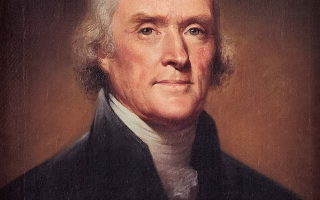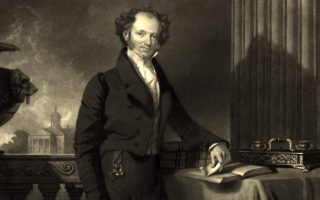kimzolciakwedding.com – James Madison, the fourth president of the United States, is widely celebrated for his intellectual prowess, his contributions to the drafting of the U.S. Constitution, and his role in shaping the early political framework of the nation. Often referred to as the “Father of the Constitution,” Madison’s political philosophy and statesmanship were pivotal during the most formative years of the United States. His ideas, rooted in Enlightenment principles and a deep understanding of human nature, helped guide the creation of a government designed to balance liberty with order.
Early Life and Intellectual Development
Birth and Family Background
James Madison was born on March 16, 1751, in Port Conway, Virginia, into a prominent Virginia family. His father, James Madison Sr., was a wealthy planter, and his mother, Eleanor Conway, came from an esteemed Virginian family. Madison was raised on the family estate, Montpelier, and received a privileged education typical for the time, with access to private tutors and a vast library. Despite frailty and poor health during his youth, Madison’s intellect began to shine early, shaping his future as a political philosopher and statesman.
Madison’s education at Princeton University (now known as the College of New Jersey) proved to be an influential chapter in his intellectual development. At Princeton, Madison studied under the guidance of John Witherspoon, a signatory of the Declaration of Independence and a preacher steeped in Enlightenment thinking. Under Witherspoon’s tutelage, Madison was exposed to the ideas of key philosophers such as John Locke, Montesquieu, and Rousseau—thinkers whose works deeply influenced Madison’s political philosophy. Madison’s studies in history, philosophy, and the classics would provide the intellectual foundation for his later political theories and actions.
Political Philosophy and Thought
Republicanism and the Separation of Powers
Madison’s political thought was deeply shaped by the experiences and philosophical traditions of the time. He was a committed republican who believed in the necessity of a government that derived its power from the people but was carefully structured to prevent any one faction or individual from gaining too much control. He was particularly concerned with what he perceived as the dangers of “faction,” or groups of individuals pursuing their own interests at the expense of the public good.
One of Madison’s most significant contributions to political thought was his advocacy for the separation of powers. Drawing from the works of Montesquieu, Madison believed that a government should be divided into distinct branches—executive, legislative, and judicial—so that no single branch would become too powerful. His belief in this system was instrumental in the framing of the U.S. Constitution, where the powers of the federal government were distributed among these three branches with checks and balances to ensure their proper functioning.
The Influence of Enlightenment Philosophy
Madison’s political philosophy was rooted in the intellectual currents of the Enlightenment, which emphasized reason, individual rights, and the idea that government should be based on consent of the governed. His focus on liberty and the protection of individual rights shaped his approach to governance, which was grounded in the belief that government existed to secure the freedoms and rights of its citizens.
One of the core ideas of Madison’s philosophy was that government power should be limited to prevent tyranny. He feared that without strong safeguards, majority rule could result in the oppression of minority groups. This concern became a guiding principle in his advocacy for the Bill of Rights and in his design of a government that would balance the interests of different factions, states, and citizens.
Madison’s commitment to republicanism was also evident in his belief in the importance of civic virtue and the active participation of citizens in the political process. He argued that a successful republic depended on citizens who were informed, engaged, and willing to place the common good above personal or sectional interests.
The Federalist Papers: Defending the Constitution
Perhaps Madison’s most lasting intellectual legacy was his role in writing The Federalist Papers, a series of 85 essays published between 1787 and 1788 that argued in favor of the ratification of the U.S. Constitution. In these essays, Madison explained the importance of the proposed Constitution and outlined his vision for a strong but limited federal government.
Madison’s contributions to The Federalist Papers include some of the most famous essays, particularly Federalist No. 10, where he addresses the problem of faction. He argued that a large republic, with a diverse population and various competing interests, would be better equipped to manage factions than smaller states or democracies, where factions could more easily dominate the political system. By expanding the size of the republic, Madison believed that no single faction would ever become dominant, and the rights of individuals would be protected.
Federalist No. 51, another key essay written by Madison, explored the importance of the system of checks and balances and the separation of powers. In this essay, Madison argued that each branch of government must be independent but also able to check the others to maintain a balance of power.
The Federalist Papers remain one of the most important documents in American political history, offering a comprehensive explanation of the principles behind the Constitution and the reasons for its design.
Madison’s Role in the Constitutional Convention
The Virginia Plan
Madison’s contributions to the Constitutional Convention of 1787 were foundational to the creation of the U.S. Constitution. Upon arriving in Philadelphia, he presented the Virginia Plan, a blueprint for the new national government that called for a strong federal system with a bicameral legislature, an executive branch, and an independent judiciary. The Virginia Plan sought to create a more powerful federal government than the one established by the Articles of Confederation, which had proven ineffective in addressing the nation’s needs.
Madison’s plan emphasized the need for a central government that could regulate commerce, raise revenue, and provide for the common defense. The Virginia Plan also proposed a system of representation based on population, which would benefit larger states. Although the plan was eventually modified in the final document through compromises—such as the Great Compromise, which created a bicameral legislature with a Senate and a House of Representatives—Madison’s ideas about a strong federal system and separation of powers were integral to the final version of the Constitution.
The Federal System
Madison’s belief in federalism—the division of power between national and state governments—was another key component of his political philosophy. As one of the main architects of the Constitution, he believed that a strong central government was necessary to promote the general welfare, provide for national defense, and regulate interstate commerce. However, he also recognized the importance of preserving the autonomy of state governments to address local concerns.
Madison’s vision of federalism was intended to balance the need for a unified nation with the protection of individual rights and the prevention of tyranny. This balance would be further solidified with the adoption of the Bill of Rights, which Madison introduced in response to concerns about the potential for government overreach.
Madison’s Presidency and Later Years
Presidency and the War of 1812
James Madison’s presidency, which began in 1809, was marked by several significant events, most notably the War of 1812. His decision to go to war with Britain over issues such as trade restrictions, impressment of American sailors, and British support for Native American resistance in the western territories was a controversial one. However, despite the war’s difficulties—including the British burning of Washington, D.C.—Madison’s leadership ultimately helped secure American sovereignty and national unity.
During his presidency, Madison also supported internal improvements, such as the construction of roads and canals, and pushed for a national bank to stabilize the economy. Though Madison had originally opposed such federal powers, his experiences during the War of 1812 led him to support a stronger federal government to address national needs.
The Legacy of Madison’s Political Thought
Madison’s political thought and statesmanship left an indelible mark on the development of the United States. His commitment to republicanism, his advocacy for the separation of powers, and his defense of the rights of individuals laid the foundation for American democracy. As a political philosopher, he recognized the inherent tension between liberty and order, and his efforts to balance these two ideals remain central to the American political system.
Madison’s ideas continue to influence contemporary debates on the role of government, the protection of individual rights, and the structure of democratic institutions. His political legacy, both as a philosopher and as a statesman, is woven into the very fabric of American governance.
Conclusion
James Madison was not only a key figure in the founding of the United States but also one of the foremost political philosophers and statesmen in American history. His intellectual legacy, shaped by the Enlightenment and his experiences in the early years of the republic, helped to create a political system that balanced liberty with governance. As the “Father of the Constitution,” Madison’s contributions to the United States were instrumental in creating a government that has endured for centuries. Today, his ideas continue to guide and inspire those who seek to understand the principles upon which the nation was built.



